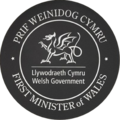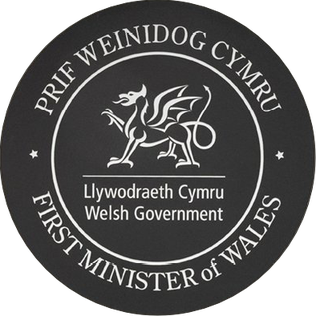First Minister of Wales
Leader of the Welsh Government From Wikipedia, the free encyclopedia
The first minister of Wales (Welsh: Prif Weinidog Cymru) is the leader of the Welsh Government and keeper of the Welsh Seal. The first minister chairs the Welsh Cabinet and is primarily responsible for the formulation, development and presentation of Welsh Government policy. Additional functions of the first minister include promoting and representing Wales in an official capacity, at home and abroad, and responsibility for constitutional affairs, as they relate to devolution and the Welsh Government.
| First Minister of Wales | |
|---|---|
| Prif Weinidog Cymru (Welsh) | |
 Logo | |
 | |
| Welsh Government Welsh Cabinet Senedd | |
| Style | First Minister (informal) The Right Honourable (UK and Commonwealth) Her Excellency (international) |
| Status | Head of Government |
| Abbreviation | FM |
| Member of | |
| Reports to | Senedd |
| Seat | Crown Buildings, Cathays Park, Cardiff |
| Nominator | Senedd |
| Appointer | The Monarch |
| Term length | Five years |
| Formation | 12 May 1999 |
| First holder | Alun Michael AM |
| Salary | £148,575 per annum (2022)[1] (including £67,920 MS salary) |
| Website | www |
The first minister is a Member of the Senedd, and is nominated by the Senedd (Welsh Parliament; Welsh: Senedd Cymru), before being officially appointed by the Monarch. Members of the Welsh Cabinet and junior ministers of the Welsh Government, as well as law officers, are appointed by the first minister. As head of the Welsh Government, the first minister is directly accountable to the Senedd for their actions and the actions of the Welsh Government. The main office of the first minister is in Tŷ Hywel, which is adjacent to the Senedd building in Cardiff Bay.[2] An additional office is also kept at the Crown Buildings, Cathays Park, Cardiff which is the headquarters of the Welsh Government.
The incumbent first minister of Wales is Eluned Morgan, Baroness Morgan of Ely, who has served since August 2024.[3] The Senedd nominated her as First Minister on 6 August 2024, with Charles III making the appointment on the same day.[4][5]
Terminology
When initially established under the Government of Wales Act 1998, Section 53(1), the post was known as Assembly First Secretary (Welsh: Prif Ysgrifennydd y Cynulliad),[6] as Wales was given a less powerful assembly and executive than either Northern Ireland or Scotland. The choice of title was also attributed to the fact that the Welsh term for First Minister, Prif Weinidog, may also be translated as Prime Minister, so a different title was chosen to avoid confusion with the prime minister of the United Kingdom. The change of title occurred after the Liberal Democrats formed a coalition government with Labour in the National Assembly in October 2000. The Government of Wales Act 2006 allowed for the post to be officially known as "First Minister" and also made the first minister Keeper of the Welsh Seal.[7][8]
Nomination and appointment
Candidates for the position of first minister are nominated by the members of the Senedd.[9] The members elect the first minister by majority vote.[10] If no one achieves a majority of the votes cast in the first ballot, there are further ballots until a majority cast their vote for one candidate. This process does not require an absolute majority of the Senedd (currently 31 out of 60 members).
Once this process is complete, the presiding officer sends a formal letter to the Monarch, who must then appoint that nominee to the position of First Minister.[11]
In December 2023, Mark Drakeford announced his intention to stand down, and remained in the position until he was replaced by Vaughan Gething on 20 March 2024, as a result of the Welsh Labour leadership election.[12][13][14]
On 16 July 2024, Gething announced his intention to resign as first minister.[15] On 24 July 2024, Eluned Morgan was elected as Gething’s successor as Welsh Labour leader. She succeeded him as First Minister,[16] after the Senedd formally nominated her as first minister on 6 August 2024, with King Charles III approving the nomination on the same day.[4][17]
List of contested elections
| Party key | Welsh Labour | |
|---|---|---|
| Plaid Cymru | ||
| Welsh Conservatives |
| Parliamentary term | Date | Candidates | Votes received |
|---|---|---|---|
| 5th Assembly | 11 May 2016[18] | Carwyn Jones | 29 |
| Leanne Wood | 29 | ||
| 12 December 2018[19] | Mark Drakeford | 30 | |
| Paul Davies | 12 | ||
| Adam Price | 9 | ||
| 6th Senedd | 20 March 2024[20] | Vaughan Gething | 27 |
| Andrew RT Davies | 13 | ||
| Rhun ap Iorwerth | 11 | ||
| 6 August 2024[4] | Eluned Morgan | 28 | |
| Andrew RT Davies | 15 | ||
| Rhun ap Iorwerth | 12 | ||
| Abstentions | 1 |
Role
Summarize
Perspective
Under the arrangements in the Government of Wales Act 1998, executive functions are conferred on the Senedd and then separately delegated to the first minister and to other Cabinet Ministers and staff as appropriate.[6]
Until the Government of Wales Act 2006, these were delegated powers of the UK government. Since that Act came into force in May 2007, however, the first minister has been appointed by the monarch and represents the Crown in Wales.[7] Whilst this makes little practical difference, it was a huge symbolic shift, as for the first time the head of government in Wales is appointed by the Crown on the advice of the elected representatives of the Welsh people.
The first minister appoints the Welsh Ministers, Deputy Welsh Ministers and the Counsel General for Wales (collectively known as the Welsh Government), with the approval of the British sovereign.[7]
Since the separation between the legislative and the executive on the enactment of the Government of Wales Act 2006 (upon appointment of the first minister, 25 May 2007), the Welsh ministers exercise functions in their own right. Any further transfers of executive functions from the UK Government will be made directly to the Welsh Ministers (with their consent) by an Order in Council approved by Parliament.
The first minister is accountable and responsible for:
- Exercise of functions by the cabinet of the Welsh Government
- Policy development and coordination of policy
- The relationships with the rest of the United Kingdom, Europe and Wales Abroad
- Staffing/civil service.
See also
References
Sources
External links
Wikiwand - on
Seamless Wikipedia browsing. On steroids.

